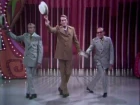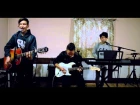The Brotherhood of St Gregory | pl
Gregory Isaac (ur. 15 lipca 1950 w Kingston,zm. 25 października 2010r.) jamajski wokalista reggae.
W latach 70. zdobył dużą popularność na Jamajce, współpracując z czołowymi producentami i studiami muzycznymi. Wraz z Errolem Dunkleyem założył w 1973 własną wytwórnię African Museum. Wykonywał zarówno zaangażowane utwory zaliczane do roots reggae jak i lżejsze, romantyczne piosenki, dzięki którym stał się klasykiem lovers rock. 1974 rok to czas, gdy ukazała się składanka przebojów Gregory'ego Isaacsa - "In person". Dwa lata później nadszedł moment, kiedy artysta osiągnął szczyt popularności. Od tego czasu światło dzienne ujrzały kolejne płyty ("Soon Forward" i "Cool Ruler").
Na początku lat...
Gregory Page (born 14 April 1963 in London, England) is an American-Irish singer, songwriter, guitarist, cabaret artist, record producer and filmmaker. In the 1990s, Gregory was a member of The Rugburns.
As a teenager, Page attended Trinity College of Music where he studied classical guitar and composition. At the age of sixteen, Page moved to Southern California where he began writing and recording music. Besides working on his own music, Page has also worked with eclectic array of artists such as Jason Mraz, John Doe, Jewel, Tom Brosseau, Steve Poltz and A.J. Croce. In 1996, John Doe, formerly of the...
Brotherhood Of The Lake were a bleak and heavy but original and inventive Plymouth, Devon-based band. They toured with The Bled and Johnny Truant and played shows with Architects, The Chariot, Misery Signals, Terror, Dead Swans, August Burns Red, Protest The Hero, The Ghost Of A Thousand, Shaped By Fate and more. Brotherhood Of The Lake were featured in Metal Hammer magazine and received live reviews in Kerrang! and Rock Sound. They split in 2014 and some members continue in Death Parish.
.
Dick Gregory (Richard Claxton Gregory, St. Louis, Missouri, October 12, 1932 – August 19, 2017) was an American civil rights activist, social critic, writer, entrepreneur, comedian, conspiracy theorist, and occasional actor. During the turbulent 1960s, Gregory became a pioneer in stand-up comedy for his "no-holds-barred" sets, in which he mocked bigotry and racism. He performed primarily to black audiences at segregated clubs until 1961, when he became the first black comedian to successfully cross over to white audiences, appearing on television and putting out comedy record albums. Gregory was at the forefront of political activism in the 1960s, when he...






